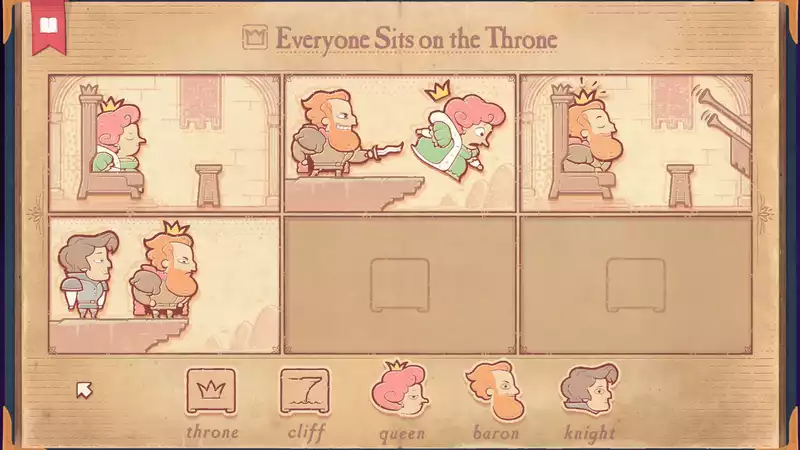In Storyteller, you will be presented with challenging puzzles derived from time-honored narrative structures and conventions. As a storyteller, you tinker with these story skeletons, dropping in characters and concepts until you have created a story that fits the title of each puzzle.
In the storyteller's comic strip world, any story can be told in three, six, or even eight panels at once. For example, suppose the title is "Eve, Dying of a Broken Heart," and we are given two different scenes, a wedding and a graveyard, and two characters, Adam and Eve. Place the wedding scene and drop Adam and Eve into it, and they fall in love. If we place the cemetery in the next panel and place Adam on the headstone, he is dead. If we place Eve next to the tomb, yes, she is heartbroken. Now, all that is left in the third panel is for Eve to kick the bucket.
From this basic beginning, the story becomes more complex, cunning, and farcical. For example, what happens if you introduce a third character into a wedding scene with someone who is already married?" well, the married person will reject the new suitor and either be heartbroken or scorned. At least, that is until a later puzzle introduces the cheating scene. In that case, the spouse could be turned into a cheater, and another character could be lurking in the nearby bushes to witness the illicit meeting.
Of course, love, betrayal, and jealousy inform many of these stories simply because they are timeless themes. At the same time, however, the work plays with traditional expectations, with flexible results. For example, the baron in the chivalric tale plots to usurp the throne. In other words, in the classic love triangle scenario, the two women should marry and live happily ever after.
This flexibility also allows "Storyteller" to shake its comedic muscles by spiraling into silly "what ifs," as in the court romance titled Everyone Rejects Edgar. Such as when Edgar dies (poor Edgar) leaving behind his wife Lenora, and when he comes back to life she is already married to Isobel.
The joy of the "storyteller," however, is not simply in the solution, but in the process itself. Often it is necessary to think backwards from the ending one is trying to achieve. For example, ask yourself why Isobel would want to poison Edgar when there is no initial animosity between the two. In some cases, the pieces are carefully manipulated to arrive at a solution, considering what each character knows and feels about the other and how to change their minds. To the game's credit, it almost always maintains a tight-knit logic, with clear intent and effect.
Even better, that logic sometimes makes it most fun to immerse oneself in pure trial and error; Storyteller is funny by design, but some of the most profoundly funny things come as side effects of failed experiments. The beauty of the system is that simply switching the order of scenes or replacing one character with another can have unforeseen effects. For example, a version of the story of the frog princess ends with two frogs flirting, or a tragedy occurs when a heartbroken Lenora drinks poison and dies, then revives, realizes she is still heartbroken, and drinks another bottle of arsenic.
Another reason these moments fit so well is the game's flawless visuals and interface. Plot building in Storyteller is merely a matter of drag and drop, and the moment you place characters in a scene, they react without blinking. Whether that means instantly falling in love with the person you're facing or pushing them off a cliff. In this hilarious take on "King Oedipus," you can see how an innocent statement, "I am your mother," suddenly becomes a shocking revelation as the pieces are moved around.
Storyteller's building-block play is so much fun that you may find yourself chomping at the bit. Solving all 51 puzzles, plus a bonus puzzle that requires you to reach certain conclusions in different ways, can take up to two hours. Nevertheless, if you agree with the game concept of taking 120 minutes to finish solving a fascinating puzzle, you won't have any complaints.
However, considering how many years it took developer Daniel Bemmerghi to create such a beautiful and consistent work, it is hard not to feel a little underwhelmed when the credits roll. Some of this is due to the fact that some concepts are left unexplored, such as the monster chapters that introduce the vampire and werewolf characters and their particular modes of behavior and then relegate them back offstage after a couple of episodes. But more problematic than mere minutes is that "The Storyteller" does not develop into something climactic or profound. It just stops.
Sure, its creative system presents some interesting ideas to chew on, such as what makes a story work or fall flat, or how a story can subvert seemingly cast-iron rules. However, such themes are visible in the first 10 minutes, as they were in last year's demo, and do not work as we move on. By contrast, other short puzzle games such as "Gorogoa" and "Unpacking" do not feel short because they arc toward a conclusion, but this is not the case in "Storyteller." For all the game's core genius in telling a story and its precise execution, what it lacks is a story to tell itself.
.

Comments